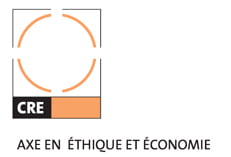
Call for papers – Workshop on Capitalism & Sustainability
Centre de recherche en éthique (CRE), Montréal, 9th-‐10th April 2015.
Mass extinction, ocean acidification, global warming, oil spills, and many other worsening ecological problems – not to mention the latest financial crisis and subsequent downturn – have renewed the urgency of the question: Could the capitalist system become sustainable? In other words, can the current way of organising our economic affairs – with private ownership of productive assets, markets as the primary mechanism for distributing goods, and firms controlled by shareholders rather than workers – promote well-‐being in the long-‐ term, or do the internal dynamics and tensions within capitalism make it incompatible with this goal?
In order to give more precise meaning to this question, both capitalism and sustainability have to be defined. For example, is a capitalist society simply one in which the means of production are privately owned, or must it include other features as well? Does sustainability include primarily environmental criteria, like the protection of renewable resources and the cleanliness of air and water, social criteria, like social mobility and equality, or both?
The goal of our workshop is to foster debate on, and understanding of, the prospects for a sustainable capitalist economy. Without getting mired in a terminological debate on how we should or should not define the two concepts, we encourage participants to present their perspectives on the tensions between the capitalist system and the ideal of sustainability, as well as, potentially, on avenues of reform that could be pursued to alleviate or mitigate these tensions. We are inviting a number of authors who have made important contributions to this debate in recent years, but we are also seeking the participation of new voices.
Here is a non-‐exhaustive list of questions that presentations at the workshop might address:
• Can the capitalist system work without growth?
• What limits would sustainability place on economic growth?
• What is or are the best alternative(s) to capitalism?
• Can the negative environmental externalities of capitalism be contained through regulation and, if so, how?
• Does capitalism necessarily generate inequalities of the magnitude we experience today or are these contingent? If the latter, how could they be reduced?
• Are the barriers to sustainability primarily systemic, or do they lie in the preferences of economic agents? What is the influence of the former on the latter?
• Are there any promising models for governing common pool resources on a global scale?
• How might we think about the relationship between social stability and environmental sustainability?
Keynote speakers:
-‐ Tim Jackson,Centre for Environmental Strategy, University of Surrey, England
-‐ Cynthia Kaufman, Institute for Community and Civic Engagement, De Anza College, United States
-‐ Raul Pacheco-‐Vega, Public Administration, CIDE Région Centro, Mexico
-‐ Peter Victor, Faculty of Environmental Studies, University or York, Canada
Those interested in participating in the workshop should send an abstract of 500 words to peter.dietsch@umontreal.ca by January 5th 2015.
Organizing committee:
Peter Dietsch, Philosophie, Université de Montréal
Greg Mikkelson, Philosophy & School of Environment, McGill University
Will Roberts, Political Science, McGill University



